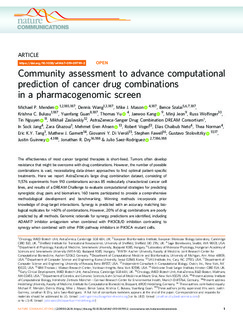Community assessment to advance computational prediction of cancer drug combinations in a pharmacogenomic screen
Journal article, Peer reviewed
Published version

View/
Date
2019Metadata
Show full item recordCollections
- Institutt for bioingeniørfag [184]
- Institutt for biologi [2512]
- Institutt for klinisk og molekylær medisin [3426]
- Publikasjoner fra CRIStin - NTNU [37175]
Original version
10.1038/s41467-019-09799-2Abstract
The effectiveness of most cancer targeted therapies is short-lived. Tumors often developresistance that might be overcome with drug combinations. However, the number of possiblecombinations is vast, necessitating data-driven approaches tofind optimal patient-specifictreatments. Here we report AstraZeneca’s large drug combination dataset, consisting of11,576 experiments from 910 combinations across 85 molecularly characterized cancer celllines, and results of a DREAM Challenge to evaluate computational strategies for predictingsynergistic drug pairs and biomarkers. 160 teams participated to provide a comprehensivemethodological development and benchmarking. Winning methods incorporate priorknowledge of drug-target interactions. Synergy is predicted with an accuracy matching bio-logical replicates for >60% of combinations. However, 20% of drug combinations are poorlypredicted by all methods. Genomic rationale for synergy predictions are identified, includingADAM17 inhibitor antagonism when combined with PIK3CB/D inhibition contrasting tosynergy when combined with other PI3K-pathway inhibitors in PIK3CA mutant cells.
